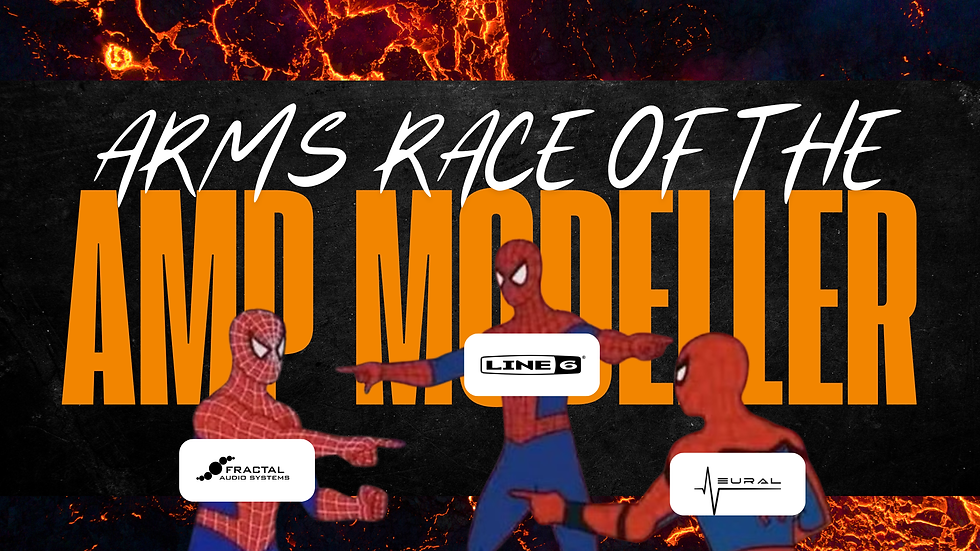The problem with amp modellers and the quest for tonal accuracy
- Philip Weller
- Jun 27, 2025
- 3 min read
Updated: Jul 11, 2025
Each Developer Claims to Have the Most Authentic Amp Tones in the Game, But Does It Really Matter?

Understanding Guitar Tone
Tone is a term that can ignite passionate discussions among guitar players. For many, it represents the holy grail of sound. Some musicians chase new gear to achieve their perfect tone, while others focus on mastering gain levels. It's vital to understand that more gain doesn't always equate to better sound.
With an ever-growing market of amp modelers, players now have numerous tools at their disposal. They can access a variety of amp simulations, from the clean twang of a Fender Twin to the robust sound of a Mesa/Boogie. However, this presents a dilemma.
Each company, including Neural DSP and Line 6, has its own technology. Neural DSP uses the supercomputer TINA, while Line 6 employs algorithmic processing. They all assert that their simulations provide the best sound. But who are they marketing to?
Personal Experience with Amplifiers
To illustrate, I've never played a Bogner Uberschall tube amp. While I know it’s a highly respected amp used by many professionals, I can only imagine its sound. If I were to compare a Quad Cortex, Helix Stomp, Tone Master Pro, and a budget model from Harley Benton, how could I determine which one truly captures the Bogner tone? It's like comparing tribute bands when I've never heard the original.

The Importance of Context
So, does context matter? What if someone falls in love with a modeled EVH 5150 without ever playing the real thing? Good tone is quality irrespective of context. The beauty of a modeler is its ability to provide numerous amp options, allowing players to find what resonates with them. We must avoid falling into the trap of gatekeeping, where players limit each other’s enjoyment based on arbitrary standards.
Such accidental ignorance can actually be beneficial. Growing up, I thought you could only prefer either Blink-182 or Sum 41. I later realized that musical tastes can be diverse and multifaceted.
Some gear enthusiasts strive for conformity. Pop stars like Willow and Phoebe Bridgers face ridicule for their guitar choices. Willow’s Jackson V and Phoebe’s B.C. Rich Warlock are criticized because they diverge from traditional styles.
Yet innovators like Cecil Alexander showcase how versatility matters. He brilliantly uses a Jackson Soloist for non-metal genres. This creativity reflects that great innovation can emerge when we explore outside conventional parameters.
Innovation and Exploration
Imagine a player experimenting with a modeller's virtual amps. They might discover unexpected combinations, such as a Fender Twin delivering fantastic djent tones or a Dual Rectifier producing crisp indie sounds. Embracing these innovations fosters creativity. Modellers enable this exploration.

The Power of Marketing
From a marketing perspective, companies aggressively promote the amps they model. This strategy helps them capitalize on the established reputation of high-end gear. Who wouldn’t want a pedal housing a Dumble or toggling between a fiery 5150 and a vintage JCM800? The allure of having all these sounds in one unit is powerful.
The Dumble versus Behringer lawsuit exemplifies how companies leverage one another's histories. They pitch that their modellers boast the world’s finest amps, paired with iconic pedals like the TS808 tube screamer or Klon Centaur. This claim is much more enticing than offering a simple British-style or an American tweed amp.
Many modeller users likely haven't played the original amps. However, it doesn't diminish their experience. For many, modellers represent the sole avenue to explore a wide range of tones. If it sounds good, even if it's not an exact replica, that enjoyment is valid.
Neural DSP’s amp models, while based on real amps, often include modern features like presence dials not found in the originals. Hence, they are not pure representations. Regardless, if it sounds great, that’s what matters.
Become a Master of Mixing
Want to enhance your recording and mixing skills? Learn how small tone adjustments can make your mix shine. Join Modern Metal Academy's Recording Masterclass.
The course features 24 in-depth lessons over nine hours. You will learn the process of achieving optimal sound quality for your music. Discover tips and exercises at your own pace, as we analyze mixes for their effectiveness. For instance, we’ll dissect how to optimize the mix of Monuments' Lavos, a track that has garnered over four million Spotify streams.
Head here for more information. We look forward to seeing you there!
Exploring Tone Further
As players continue to explore various tone options and choices, one can't help but wonder: what is the essence of tone? Is it the gear, the player's skill, or the emotional connection? Tone is subjective, and every musician's journey is unique.
Whether you're a seasoned pro or a beginner, the quest for the perfect tone is personal. Gear choices reflect our individuality as much as our music does. Embrace the diversity of sounds and the innovations that come with it. Each experience teaches us something valuable, adding to our growth as musicians.



Comments